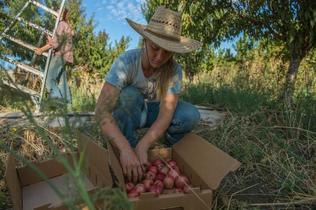AgTech Honors Women That Solve Modern Problems!
‘From Farms to Incubators’ exhibition honors women who merge ag and tech to solve modern problems
Multimedia exhibition premiers Nov. 12 at National Steinbeck Center
The modern intersection of agriculture and technology has brought to the forefront a diverse generation of women working to overcome rising challenges through new perspectives and solutions.
A new special exhibition at the Steinbeck Center in Salinas lifts up stories of these innovators to help inspire and encourage young women to consider careers in agtech.
“From Farms to Incubators: Women Innovators in California Agtech” uses multimedia and digital storytelling – including video, documentary and still photography – to honor these groundbreaking pioneers. The exhibition is the brainchild of Amy Wu an award-winning journalist for women’s ag and agtech movement and the creator of “From Farms to Incubators.”
“My passion to unearth underreported stories and amplify new voices is what led me to highlight the stories of emerging communities in agriculture,” says Wu. “Ultimately, I hope the exhibition, film series and book serves as vehicles to inspire youth – especially those from rural or underserved communities – to consider that agriculture extends far beyond tractors and overalls and it is a sector that offers an amazing range of opportunities that involve innovation.”
Michele Speich the Executive Director National Steinbeck Center says:
“Women for centuries have played a vital role in farm operations across the country and globally. We are thrilled that Amy Wu has chosen to tell the stories of minority women entrepreneurs in Agtech in the Salinas Valley and beyond in a book and in an exhibition at the National Steinbeck Center,” says Speich.
Presented by the group From Farms to Incubators, the exhibition kicks off Thursday, Nov. 12 with a virtual opening event from 4-6 p.m. PACIFIC TIME, with viewing available through Jan. 12.
The virtual opening will include special speakers including California Senator Anna Caballero, Dennis Donohue the head of Western Growers Center for Innovation and Technology and Karen Caplan the president and CEO of Frieda’s Specialty Produce, a panel discussion led by leading women innovators in ag and agtech, and a sneak preview of the exhibition and films.
Attendees have the opportunity to win prizes, including a copy of the forthcoming book “From Farms to Incubators: Women Innovators in California Agtech,” telling the stories of women entrepreneurs who use technology to help solve problems ranging from climate change and limited water to uncertainties in immigration policy. The book will be published in April 2021 under Linden Publishing’s Craven Street Books division, specializing in titles on California and the history of the western United States.
Many of those portrayed are women of color who come from diverse backgrounds, the first in their families to complete higher education. What drew them into the nascent but fast-growing sector of agtech? What caused them to uproot themselves to pursue a start-up dream in an industry that continues to be dominated by men? How are they getting their innovation into the hands of growers?
The exhibition and the book attempt to answer these questions and create awareness of women leaders and entrepreneurs.
The National Steinbeck Center in Salinas, Calif., is dedicated to Steinbeck’s creative legacy: to participate, to inspire, to educate, and to understand one another. Find out more at www.steinbeck.org.
“From Farms to Incubators” is a multimedia platform that uses digital storytelling to increase awareness of women leaders and entrepreneurs and their contribution using technology through the agriculture sector, and encourage women to pursue careers in agtech. Find out more at www.farmstoincubators.com
For more information email Amy Wu at amy@farmstoincubators.com or call 914-771-1275.










